英语单词讲解
- 格式:pptx
- 大小:92.37 KB
- 文档页数:14
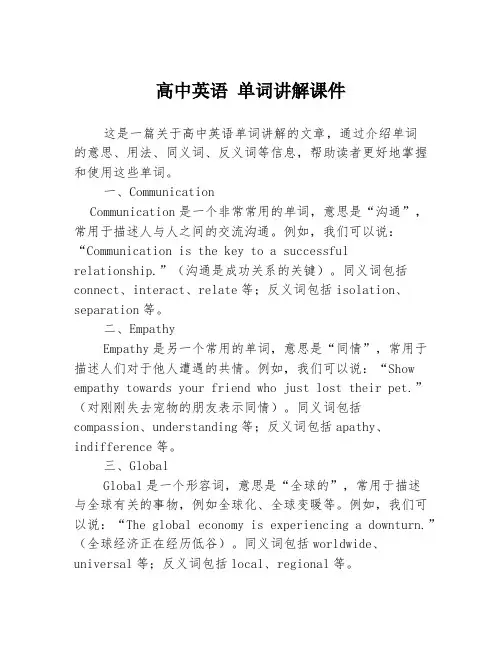
高中英语单词讲解课件这是一篇关于高中英语单词讲解的文章,通过介绍单词的意思、用法、同义词、反义词等信息,帮助读者更好地掌握和使用这些单词。
一、CommunicationCommunication是一个非常常用的单词,意思是“沟通”,常用于描述人与人之间的交流沟通。
例如,我们可以说:“Communication is the key to a successful relationship.”(沟通是成功关系的关键)。
同义词包括connect、interact、relate等;反义词包括isolation、separation等。
二、EmpathyEmpathy是另一个常用的单词,意思是“同情”,常用于描述人们对于他人遭遇的共情。
例如,我们可以说:“Show empathy towards your friend who just lost their pet.”(对刚刚失去宠物的朋友表示同情)。
同义词包括compassion、understanding等;反义词包括apathy、indifference等。
三、GlobalGlobal是一个形容词,意思是“全球的”,常用于描述与全球有关的事物,例如全球化、全球变暖等。
例如,我们可以说:“The global economy is experiencing a downturn.”(全球经济正在经历低谷)。
同义词包括worldwide、universal等;反义词包括local、regional等。
四、InnovationInnovation是一个名词,意思是“创新”,常用于描述新的、有创造性的想法或方法。
例如,我们可以说:“The company's success can be attributed to its culture of innovation.”(公司的成功可以归因于其创新的文化)。
同义词包括invention、creation等;反义词包括imitation、conformity等。
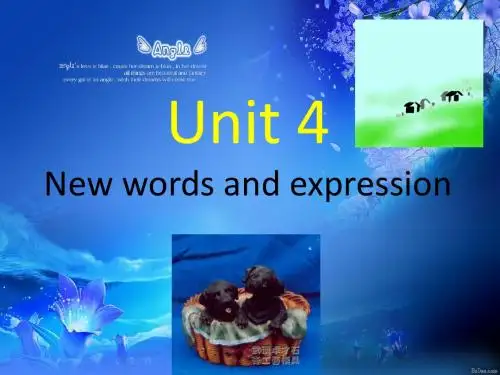

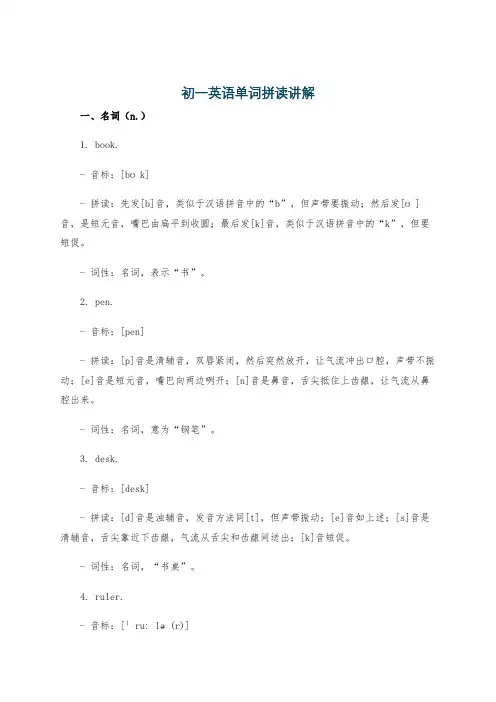
初一英语单词拼读讲解一、名词(n.)1. book.- 音标:[bʊk]- 拼读:先发[b]音,类似于汉语拼音中的“b”,但声带要振动;然后发[ʊ]音,是短元音,嘴巴由扁平到收圆;最后发[k]音,类似于汉语拼音中的“k”,但要短促。
- 词性:名词,表示“书”。
2. pen.- 音标:[pen]- 拼读:[p]音是清辅音,双唇紧闭,然后突然放开,让气流冲出口腔,声带不振动;[e]音是短元音,嘴巴向两边咧开;[n]音是鼻音,舌尖抵住上齿龈,让气流从鼻腔出来。
- 词性:名词,意为“钢笔”。
3. desk.- 音标:[desk]- 拼读:[d]音是浊辅音,发音方法同[t],但声带振动;[e]音如上述;[s]音是清辅音,舌尖靠近下齿龈,气流从舌尖和齿龈间送出;[k]音短促。
- 词性:名词,“书桌”。
4. ruler.- 音标:[ˈruːlə(r)]- 拼读:[r]音是卷舌音,舌尖向上卷起,靠近上齿龈;[uː]是长元音,嘴巴尽量收圆并突出;[l]音是舌边音,舌尖抵住上齿龈,气流从舌头两边出来;最后的[r]音在英式英语中可发可不发,美式英语中一般要发。
- 词性:名词,“尺子”。
5. pencil.- 音标:[ˈpensl]- 拼读:[p]音清辅音;[e]音短元音;[n]音鼻音;[s]音清辅音;[l]音舌边音。
- 词性:名词,“铅笔”。
6. school.- 音标:[skuːl]- 拼读:[s]音清辅音;[k]音清辅音;[uː]长元音;[l]音舌边音。
- 词性:名词,“学校”。
二、动词(v.)1. look.- 音标:[lʊk]- 拼读:[l]音舌边音;[ʊ]短元音;[k]音清辅音。
- 词性:动词,“看”。
2. play.- 音标:[pleɪ]- 拼读:[p]音清辅音;[l]音舌边音;[eɪ]双元音,由[e]滑向[ɪ]。
- 词性:动词,“玩;打(球)”等。
3. read.- 音标:[riːd]- 拼读:[r]音卷舌音;[iː]长元音;[d]音浊辅音。
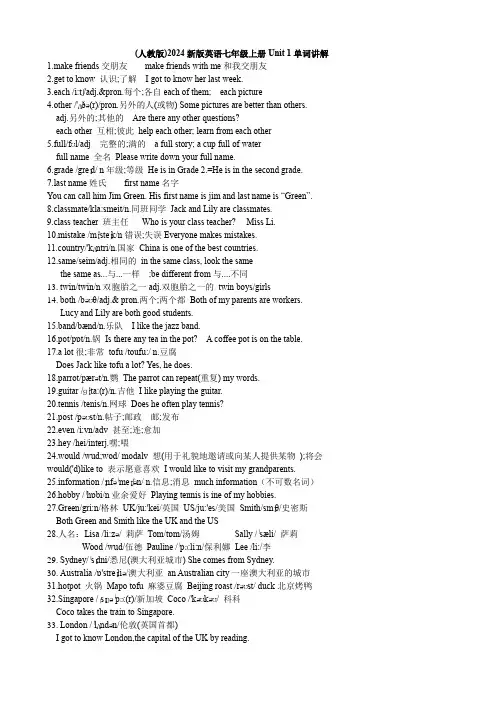
1.make friends交朋友make friends with me和我交朋友2.get to know 认识;了解I got to know her last week.3.each /i:tʃ/adj.&pron.每个;各自each of them; each picture4.other /'ʌðə(r)/pron.另外的人(或物) Some pictures are better than others. adj.另外的;其他的Are there any other questions?each other 互相;彼此help each other; learn from each other5.full/fʊl/adj 完整的;满的 a full story; a cup full of waterfull name 全名Please write down your full name.6.grade /greɪd/ n年级;等级He is in Grade 2.=He is in the second grade.st name姓氏first name名字You can call him Jim Green. His first name is jim and last name is “Green”.8.classmate/kla:smeit/n.同班同学Jack and Lily are classmates.9.class teacher 班主任---Who is your class teacher? ---Miss Li.10.mistake /mɪ'steɪk/n错误;失误Everyone makes mistakes.11.country/'kʌntri/n.国家China is one of the best countries.12.same/seim/adj.相同的in the same class, look the samethe same as...与...一样;be different from与....不同13.twin/twin/n双胞胎之一adj.双胞胎之一的twin boys/girls14.both /bəʊθ/adj.& pron.两个;两个都Both of my parents are workers.Lucy and Lily are both good students.15.band/bænd/n.乐队I like the jazz band.16.pot/pɒt/n.锅Is there any tea in the pot? A coffee pot is on the table.17.a lot很;非常tofu /toufu:/ n.豆腐Does Jack like tofu a lot? Yes, he does.18.parrot/pærət/n.鹦The parrot can repeat(重复) my words.19.guitar /ɡɪ'ta:(r)/n.吉他I like playing the guitar.20.tennis /tenis/n.网球Does he often play tennis?21.post /pəʊst/n.帖子;邮政邮;发布22.even /i:vn/adv 甚至;连;愈加23.hey /hei/interj.嘿;喂24.would /wud;wod/ modalv 想(用于礼貌地邀请或向某人提供某物);将会would('d)like to 表示愿意喜欢I would like to visit my grandparents.rmation /ɪnfəˈmeɪʃən/ n.信息;消息much information(不可数名词)26.hobby /ˈhɒbi/n业余爱好Playing tennis is ine of my hobbies.27.Green/gri:n/格林UK/ju:'kei/英国US/ju:'es/美国Smith/smɪθ/史密斯Both Green and Smith like the UK and the US28.人名:Lisa /li:zə/ 莉萨Tom/tɒm/汤姆Sally /ˈsæli/ 萨莉Wood /wud/伍德Pauline /ˈpɔ:li:n/保利娜Lee /li:/李29.Sydney/ˈsɪdni/悉尼(澳大利亚城市) She comes from Sydney.30.Australia /ɒ'streɪliə/澳大利亚an Australian city一座澳大利亚的城市31.hotpot 火锅Mapo tofu 麻婆豆腐Beijing roast /rəʊst/ duck北京烤鸭32.Singapore /ˌsɪŋəˈpɔ:(r)/新加坡Coco /'kəʊkəʊ/ 科科Coco takes the train to Singapore.33.London /ˈlʌndən/伦敦(英国首都)1.mean v意思是;打算means/meant/meaningWhat does the word mean?这个单词什么意思?What does she mean by doing that? 她那样做什么意思?2.husband n.丈夫husband and wife夫妇3.bat n.球棒;球拍two ping-pong bats乒乓球拍4.play ping-pong打乒乓球= play table tennis5.every day 每天---How often do you watch TV, Mr.Li ? ---Every day.Everyday adj. 每天的everyday life日常生活6.together adv在一起;共同We study together every day.7.fishing rod 钓竿My father uses a fishing rod to fish.8.spend v花(时间钱等) a lot of/lots of大量;许多The boy in red often apends lots of time playing ping-pong.9.really adv 非常;确实;真正地(可修饰形容词,副词或动词)The book is really interesting.They are really my aunt and uncle.Your mother really loves you.10.activity n.活动do after-school/classroom activities11.chess n.国际象棋Chinese chess 中国象棋(球类和棋类钱不加the,乐器前加the)He plays Chinese chess and plays the piano as hobbies.他下中国象棋和弹钢琴作为爱好。
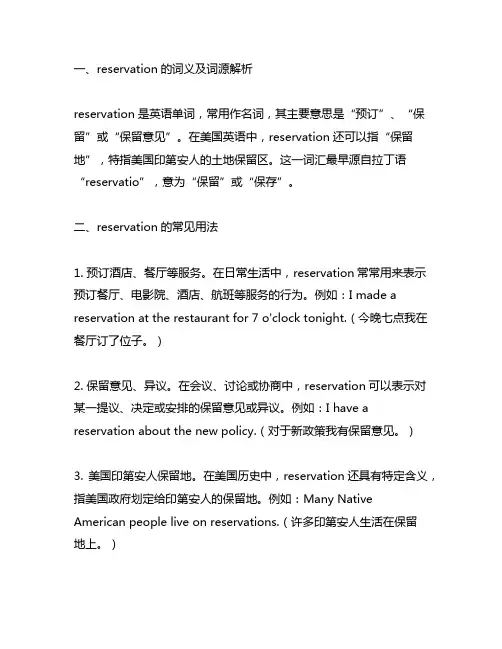
一、reservation的词义及词源解析reservation是英语单词,常用作名词,其主要意思是“预订”、“保留”或“保留意见”。
在美国英语中,reservation还可以指“保留地”,特指美国印第安人的土地保留区。
这一词汇最早源自拉丁语“reservatio”,意为“保留”或“保存”。
二、reservation的常见用法1. 预订酒店、餐厅等服务。
在日常生活中,reservation常常用来表示预订餐厅、电影院、酒店、航班等服务的行为。
例如:I made a reservation at the restaurant for 7 o'clock tonight.(今晚七点我在餐厅订了位子。
)2. 保留意见、异议。
在会议、讨论或协商中,reservation可以表示对某一提议、决定或安排的保留意见或异议。
例如:I have a reservation about the new policy.(对于新政策我有保留意见。
)3. 美国印第安人保留地。
在美国历史中,reservation还具有特定含义,指美国政府划定给印第安人的保留地。
例如:Many Native American people live on reservations.(许多印第安人生活在保留地上。
)三、reservation的词性变化reservation是一个多义词,可以用作名词或动词,其变形形式如下:名词:reservation复数形式:reservations动词:reserve过去式:reserved过去分词:reserved现在分词:reserving第三人称单数:reserves四、reservation的相关词汇及搭配1. make a reservation:预订、订位2. reservation fee:预订费3. with reservation:带着保留意见4. reservation system:预订系统5. reservation number:预订编号五、reservation的使用注意事项1. 在预订服务时,通常需要提供预订人的尊称、通联方式、预计到达时间等信息。
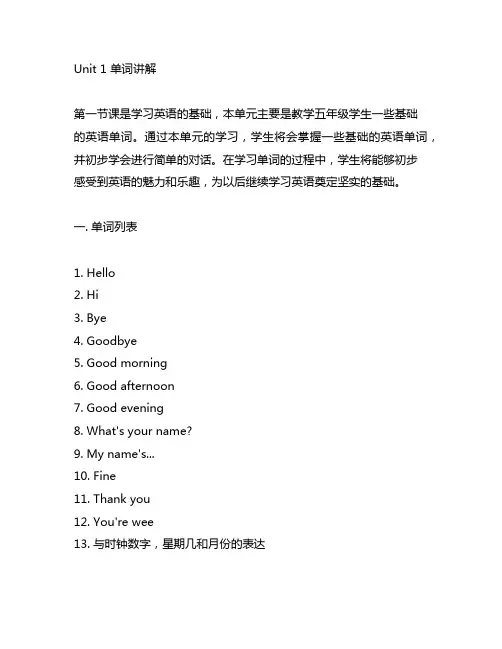
Unit 1 单词讲解第一节课是学习英语的基础,本单元主要是教学五年级学生一些基础的英语单词。
通过本单元的学习,学生将会掌握一些基础的英语单词,并初步学会进行简单的对话。
在学习单词的过程中,学生将能够初步感受到英语的魅力和乐趣,为以后继续学习英语奠定坚实的基础。
一. 单词列表1. Hello2. Hi3. Bye4. Goodbye5. Good morning6. Good afternoon7. Good evening8. What's your name?9. My name's...10. Fine11. Thank you12. You're wee13. 与时钟数字,星期几和月份的表达二. 单词讲解1. Hello和Hi这两个都是打招呼用语,表示你好,你可以用它们来和别人打招呼。
2. Goodbye表示再见,当你和别人分别的时候可以用这个词。
3. Good morning,Good afternoon和Good evening这三个都是问候用语,分别表示早上好,下午好,晚上好。
4. What's your name?和My name's...“What's your name?”的意思是你叫什么名字?“My name's...”的意思是我的名字叫...5. Fine表示好的,当别人问你“how are you?”时,你可以回答“I'm fine”,意思是我很好。
6. Thank you和You're wee“Thank you”表示谢谢,当别人帮助你时,你应该说一声谢谢。
“You're wee”表示不用谢,对方回答“Thank you”时,你可以说“You're wee”。
7. 时间、星期几和月份的表达在这个单元中,学生还将学习到英语中表示时间、星期几和月份的表达方式,这对于以后的学习将有很大的帮助。
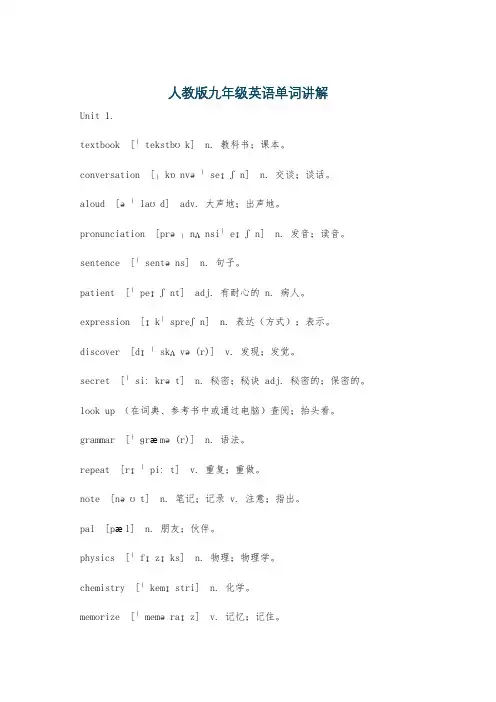
人教版九年级英语单词讲解Unit 1.textbook [ˈtekstbʊk] n. 教科书;课本。
conversation [ˌkɒnvəˈseɪʃn] n. 交谈;谈话。
aloud [əˈlaʊd] adv. 大声地;出声地。
pronunciation [prəˌnʌnsiˈeɪʃn] n. 发音;读音。
sentence [ˈsentəns] n. 句子。
patient [ˈpeɪʃnt] adj. 有耐心的 n. 病人。
expression [ɪkˈspreʃn] n. 表达(方式);表示。
discover [dɪˈskʌvə(r)] v. 发现;发觉。
secret [ˈsiːkrət] n. 秘密;秘诀 adj. 秘密的;保密的。
look up (在词典、参考书中或通过电脑)查阅;抬头看。
grammar [ˈɡræmə(r)] n. 语法。
repeat [rɪˈpiːt] v. 重复;重做。
note [nəʊt] n. 笔记;记录 v. 注意;指出。
pal [pæl] n. 朋友;伙伴。
physics [ˈfɪzɪks] n. 物理;物理学。
chemistry [ˈkemɪstri] n. 化学。
memorize [ˈmeməraɪz] v. 记忆;记住。
pattern [ˈpætn] n. 模式;方式。
Unit 2.lantern [ˈlæntən] n. 灯笼。
stranger [ˈstreɪndʒə(r)] n. 陌生人。
relative [ˈrelətɪv] n. 亲属;亲戚。
put on 增加(体重);发胖。
pound [paʊnd] n. 磅(重量单位);英镑(英国货币单位)folk [fəʊk] adj. 民间的;民俗的。
goddess [ˈɡɒdes] n. 女神。
whoever [huːˈevə(r)] pron. 无论谁;不管什么人。
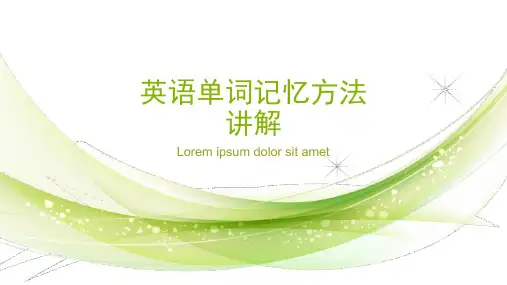
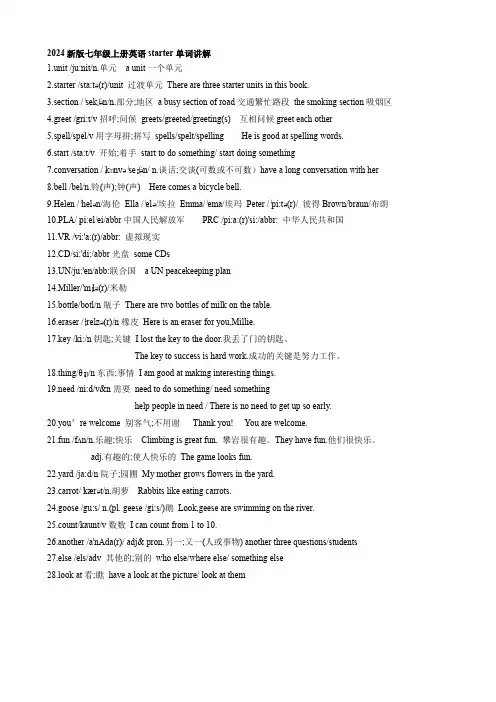
2024新版七年级上册英语starter单词讲解1.unit /ju:nit/n.单元 a unit一个单元2.starter /sta:tə(r)/unit 过渡单元There are three starter units in this book.3.section /ˈsekʃən/n.部分;地区a busy section of road交通繁忙路段the smoking section吸烟区4.greet /gri:t/v招呼;问候greets/greeted/greeting(s) 互相问候greet each other5.spell/spel/v用字母拼;拼写spells/spelt/spelling He is good at spelling words.6.start /sta:t/v 开始;着手start to do something/ start doing something7.conversation /ˌkɒnvəˈseɪʃən/ n.谈话;交谈(可数或不可数)have a long conversation with her8.bell /bel/n.铃(声);钟(声) Here comes a bicycle bell.9.Helen /ˈhelən/海伦Ella /ˈelə/埃拉Emma/ˈema/埃玛Peter /ˈpi:tə(r)/ 彼得Brown/braun/布朗10.PLA/ˌpi:elˈei/abbr中国人民解放军PRC /pi:a:(r)'si:/abbr: 中华人民共和国11.VR /vi:'a:(r)/abbr: 虚拟现实12.CD/si:'di:/abbr光盘some CDs13.UN/ju:'en/abb:联合国 a UN peacekeeping planler/'mɪlə(r)/米勒15.bottle/botl/n瓶子There are two bottles of milk on the table.16.eraser /ɪ'relzə(r)/n橡皮Here is an eraser for you,Millie.17.key /ki:/n钥匙;关键I lost the key to the door.我丢了门的钥匙。
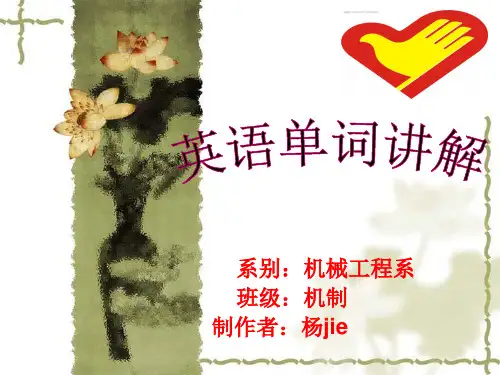
九年级英语单词讲解一、“ability” [əˈbɪləti] n.(名词)1. 词义:能力;才能。
- 例如:He has the ability to solve difficult problems.(他有解决难题的能力。
)二、“absent” [ˈæbsənt] adj.(形容词)1. 词义:缺席的;不在的。
- 例如:He was absent from school yesterday.(他昨天旷课了。
)三、“achieve” [əˈtʃi:v] v.(动词)1. 词义:达到;完成;成功。
- 例如:He has achieved his goal.(他已经实现了他的目标。
)四、“action” [ˈækʃn] n.(名词)1. 词义:行动;行为。
- 例如:We should take action to protect the environment.(我们应该采取行动保护环境。
)五、“active” [ˈæktɪv] adj.(形容词)1. 词义:积极的;活跃的。
- 例如:She is an active girl in class.(她在课堂上是个活跃的女孩。
)六、“add” [æd] v.(动词)1. 词义:添加;增加。
- 例如:Add some salt to the soup.(往汤里加些盐。
)七、“address” [əˈdres] n.(名词)/v.(动词)1. 作为名词:地址。
- 例如:Please write down your address.(请写下你的地址。
)2. 作为动词:演说;向……说话。
- 例如:He will address the meeting tomorrow.(他明天将在会议上发言。
)八、“advantage” [ədˈvɑ:ntɪdʒ] n.(名词)1. 词义:优点;优势。
- 例如:His height gives him an advantage in basketball.(他的身高在篮球方面给他一个优势。
六年级英语单词讲解一、young [jʌŋ] adj.(形容词)年轻的;幼小的。
- 例句:My sister is very young.(我的妹妹很年轻。
)- 用法:可用来描述人或者动物的年龄小,在句子中可作定语修饰名词,如a young boy(一个年轻的男孩),也可作表语,如He is young.(他很年轻。
)二、old [əʊld] adj. 年老的;旧的。
- 例句:My grandfather is old.(我的祖父年纪大了。
)/ This is an old book.(这是一本旧书。
)- 用法:描述人年龄大或者事物年代久远。
作定语如an old man(一位老人),作表语如The house is old.(这房子很旧了。
)三、tall [tɔːl] adj. 高的。
- 例句:The giraffe is very tall.(长颈鹿非常高。
)- 用法:用于形容人、建筑物、树木等的高度,作定语如a tall building(一座高楼),作表语如He is tall.(他很高。
)四、short [ʃɔːt] adj. 短的;矮的。
- 例句:This pencil is short.(这支铅笔很短。
)/ He is short.(他很矮。
)- 用法:形容物体长度短或者人的身高矮。
作定语如a short skirt(一条短裙),作表语如The tree is short.(这棵树很矮。
)五、big [bɪɡ] adj. 大的。
- 例句:The elephant has a big body.(大象有一个庞大的身体。
)- 用法:描述物体的规模、尺寸大,可作定语如a big city(一个大城市),作表语如The box is big.(这个盒子很大。
)六、small [smɔːl] adj. 小的。
- 例句:This cat is small.(这只猫很小。
)- 用法:与big相对,形容物体的规模、尺寸小,作定语如a small room(一个小房间),作表语如The ball is small.(这个球很小。